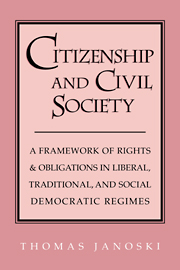 Citizenship and Civil Society
Citizenship and Civil Society Published online by Cambridge University Press: 05 June 2012
All authority comes from the People.
But the People can only maintain this authority through its obedience.
For if it allows itself to disobey the Citizens to whom it has given power, then everything is lost, there can no longer be Laws, or peace, or public safety.
The citizen who disobeys public authority disobeys himself.
Jacques-Pierre Brissot (1789)A veteran returning from Korea went to college on the GI Bill; bought his house with an FHA loan; saw his kids born in a VA hospital; started a business with an SBA loan; got electricity from the TVA and, then, water from a project funded by the EPA. …
His kids participated in the school-lunch program. … [They] made it through college courtesy of government-guaranteed student loans.
His parents retired to a farm on their social security, getting electricity from the REA and the soil tested by the USDA. When the father became ill, his life was saved with a drug developed through the NIH; the family was saved from financial ruin by Medicare.
Our veteran drove to work on the interstate; moored his boat in a channel dredged by Army engineers; and when floods hit, took Amtrak to Washington to apply for disaster relief. …
Then one day he wrote his congressman an angry letter complaining about paying taxes for all those programs created for ungrateful people.
Jonathan Yates (1988, p. 12)To save this book to your Kindle, first ensure no-reply@cambridge.org is added to your Approved Personal Document E-mail List under your Personal Document Settings on the Manage Your Content and Devices page of your Amazon account. Then enter the ‘name’ part of your Kindle email address below. Find out more about saving to your Kindle.
Note you can select to save to either the @free.kindle.com or @kindle.com variations. ‘@free.kindle.com’ emails are free but can only be saved to your device when it is connected to wi-fi. ‘@kindle.com’ emails can be delivered even when you are not connected to wi-fi, but note that service fees apply.
Find out more about the Kindle Personal Document Service.
To save content items to your account, please confirm that you agree to abide by our usage policies. If this is the first time you use this feature, you will be asked to authorise Cambridge Core to connect with your account. Find out more about saving content to Dropbox.
To save content items to your account, please confirm that you agree to abide by our usage policies. If this is the first time you use this feature, you will be asked to authorise Cambridge Core to connect with your account. Find out more about saving content to Google Drive.